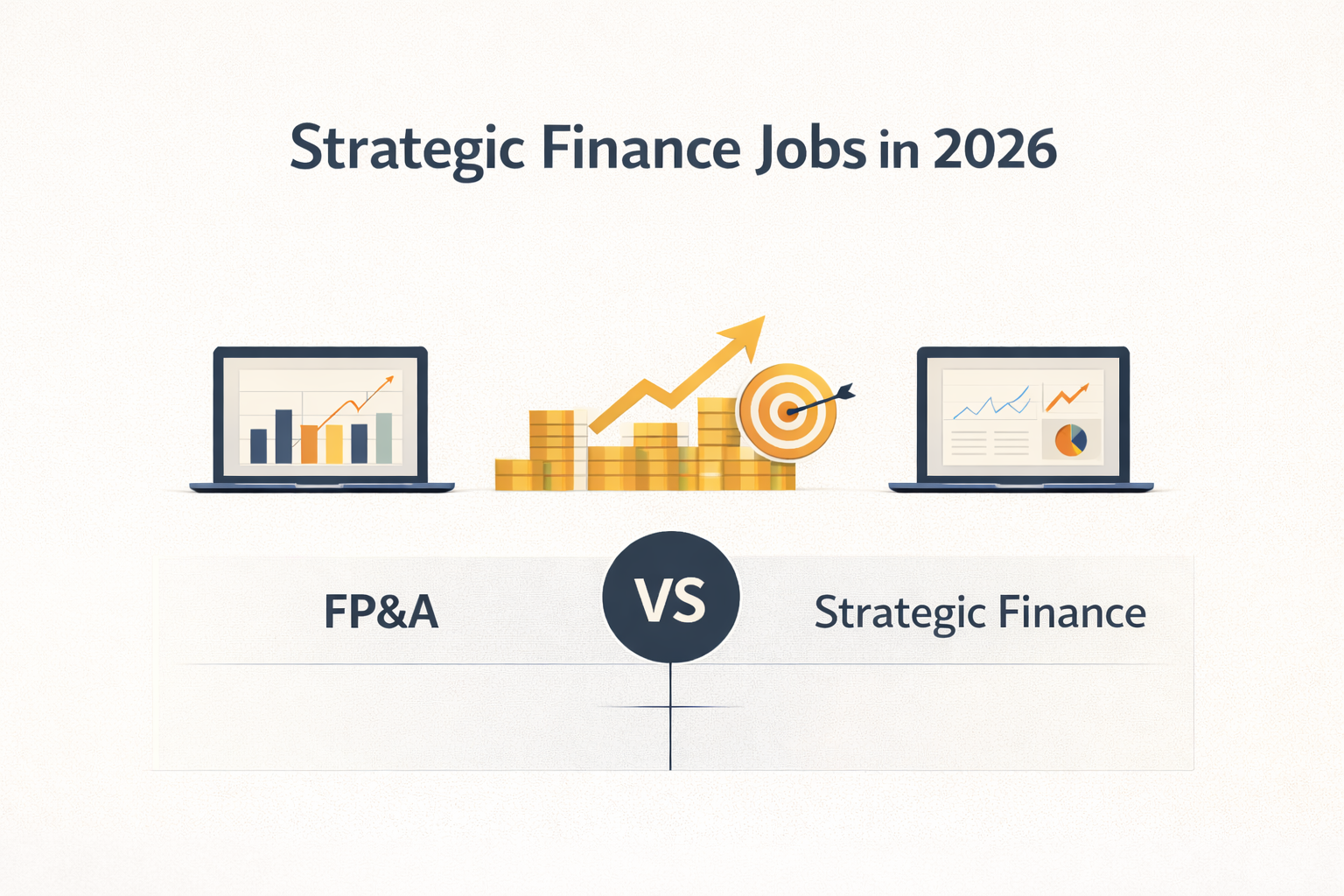What Exactly is Strategic Finance?
Table of Contents:
- Introduction
- Decoding Modern Finance
- The Essence of a Strategic Finance Approach
- Why Strategic Finance is Essential
- The Strategic Finance Advantage
- Embarking on Strategic Projects
- Essential Skills to Break In
- Strategic Finance in Action
- Enhancing Best Practices
- Empowering Growth Initiatives
- Why Take A Course?
- Navigating Financial Terrain
- Strategic Finance in Executive Meetings
- The Role of Head of Finance
- Strategic Collaboration with Department Heads
- Scenario Planning for Uncertain Times
- Balancing Act: Income Statements and Balance Sheets
- Conclusion
Introduction
In the ever-evolving business landscape, adopting a modern finance approach is crucial for achieving success. This comprehensive guide navigates the complexities of Strategic Finance, unraveling key concepts, and providing insights into why companies are increasingly embracing this transformative methodology.
Decoding Modern Finance
Strategic Finance seamlessly connects all parts of an entire business, ensuring decisions are optimized to contribute to long-term value generation. Growth-focused startups, employing a forward-thinking Strategic Finance approach, leverage cutting-edge technology, including Google Sheets, to interpret real-time financial data. This elevates finance into a collaborative department deeply intertwined with daily operations.
The Essence of a Strategic Finance Approach
A Strategic Finance approach involves more than managing cash flow statements; it's a holistic strategy aligning financial decisions with broader strategic objectives. Finance leaders, working collaboratively with business partners, now guide teams through scenario planning using historical data. This proactive approach ensures regular meetings, where the finance team, alongside department heads, evaluates growth initiatives and aligns them with the company's strategic objectives.
Why Strategic Finance is Essential
The shift from outdated financial planning to contemporary analytics is crucial, especially for fast-growing enterprises employing various software tools. Unlike traditional financial planning and analysis (FP&A), Strategic Finance integrates data from different corners of the business, providing on-the-spot insights. It's a move from a manual map to a GPS system, offering real-time guidance in an ever-changing business terrain.
In addition to integrating financial statements and financial modeling, Strategic Finance focuses on the effective management of cash flow. Finance leaders guide their teams in making strategic decisions that have broad business implications, working collaboratively with business partners and department heads.
It's a move from a manual map to a GPS system, offering real-time guidance in an ever-changing business terrain.
The Strategic Finance Advantage
Strategic Finance empowers finance teams to tackle essential questions crucial for business growth. It directs efforts towards long-term planning, steering away from routine tasks. This strategic approach translates financial complexities into actionable business insights, enabling teams to focus on significant opportunities and advisory roles for the CEO.
Embarking on Strategic Projects
As a strategic finance professional, your role goes beyond crunching numbers; you're involved in projects that shape the company's future. For instance, collaborating closely with the Growth and Marketing teams to develop a detailed spend model. This involves sophisticated Customer Acquisition Cost (CAC) and Marginal CAC analysis, ensuring every marketing dollar invested brings maximum value.
Leading fundraising efforts is another critical aspect. Here, the Strategic Finance function takes charge of the company's financial model, crafting compelling narratives, and updating the board on financial health. This role ensures the company secures the necessary capital to fuel its growth.
Delving into Customer Cohort or Lifetime Value (LTV) models is equally essential. These models drive decisions such as pricing strategies, with finance professionals understanding the long-term value of customers and contributing to setting prices that reflect this value.
Essential Skills to Break In
Breaking into the dynamic field of strategic finance requires skills beyond traditional financial roles. While professions like investment banking, sales and trading, and accounting provide a robust financial foundation, strategic finance demands additional skills:
- Operational Business Understanding: Proficiency in understanding how day-to-day business operations impact financial performance.
- Advanced Financial and Operational Modeling Skills: Although three statement models are great, on the job you will likely be modeling complex operational and business models that will help drive decisions across the company.
- Cross-Functional Collaboration: Strong communication and collaboration skills to serve as a bridge between finance and other departments.
- Technological Proficiency: Adeptness in leveraging technologies like SQL, financial software, and data analytics tools.
- Strategic Thinking: A forward-thinking mindset, contributing to long-term planning and aligning financial strategies with the broader business strategy.
- Risk Management Expertise: Proactive identification, assessment, and mitigation of operational, market, and strategic risks.
- Adaptability and Continuous Learning: A commitment to staying informed about industry trends, technological advancements, and changes in regulatory environments.
- Decision-Making Under Uncertainty: Ability to make informed decisions in ambiguous situations, considering multiple scenarios.
- Legal and Regulatory Understanding: In-depth comprehension of legal and regulatory considerations, ensuring compliance with industry-specific regulations.
Strategic Finance in Action
Strategic finance in action involves not just managing financial numbers but actively participating in shaping strategic decisions. It's about understanding the financial plan of the company and its alignment with broader strategic goals. Finance professionals now play a pivotal role in conducting detailed financial analysis to guide business leaders in making informed decisions under uncertainty.
The strategic finance team collaborates with various departments to assess the financial implications of strategic initiatives. This includes evaluating the potential cash flow impact, conducting robust financial modeling, and providing insights into the financial health of the organization. The finance team's involvement in strategic planning ensures that financial decisions align with the overall business strategy.
Enhancing Best Practices
Strategic Finance encompasses more than just embracing best practices; it involves setting them. The right technology is a cornerstone in ensuring efficient financial operations. It goes beyond the numbers, aligning with the company's strategic objectives. Finance leaders, as part of the executive management team, are instrumental in shaping and implementing best practices that contribute to the overall success of the organization.
Empowering Growth Initiatives
Strategic Finance empowers growth initiatives by providing a comprehensive framework for evaluating opportunities. Finance leaders, alongside the executive management team, guide the company in navigating the financial implications of growth strategies. This involves detailed financial analysis, scenario planning, and aligning financial decisions with strategic objectives.
Why Take A Course?
For professionals in the finance industry, especially those in investment banking, embracing Strategic Finance is a career game-changer. An online course tailored to Strategic Finance provides a deep dive into the methodology, offering practical insights and hands-on skills. This specialized training ensures that finance professionals stay ahead in a rapidly evolving industry, unlocking new opportunities for career advancement.
Navigating Financial Terrain
Strategic Finance professionals navigate the financial terrain with precision. They go beyond traditional financial management, actively participating in setting strategic objectives and aligning them with the financial plan. This involves assessing the entire business, conducting regular meetings, and ensuring that historical data informs strategic decisions.
Strategic Finance in Executive Meetings
The strategic finance team plays a crucial role in executive meetings. Finance leaders, as part of the executive management team, contribute insights into the financial health of the organization. They provide valuable input into strategic discussions, aligning financial decisions with the company's strategic objectives.
The Role of Head of Finance
The head of finance is a key player in the Strategic Finance landscape. Beyond managing day-to-day financial operations, the head of finance collaborates with department heads, ensuring a cohesive approach to financial management. This collaborative effort ensures that financial decisions support the overall strategic objectives of the organization.
Strategic Collaboration with Department Heads
Collaboration with department heads is at the heart of Strategic Finance. The finance department collaborates with various departments, providing financial insights that contribute to the success of growth initiatives. This collaboration ensures that financial decisions align with the strategic objectives set by department heads.
Scenario Planning for Uncertain Times
In uncertain times, scenario planning becomes a crucial aspect of Strategic Finance. Finance professionals, working alongside department heads and the executive management team, evaluate different scenarios to make informed decisions under uncertainty. This proactive approach ensures that the company is prepared for a range of possible outcomes.
Balancing Act: Income Statements and Balance Sheets
The Strategic Finance approach involves a delicate balancing act between income statements and balance sheets. Finance leaders, as part of the executive management team, ensure that financial decisions align with the overall financial health of the organization. This involves assessing both short-term and long-term financial implications.
Conclusion
In conclusion, navigating the future of finance requires a shift towards forward-thinking strategies. Embracing the principles of Strategic Finance not only ensures the efficient use of operational data but also positions finance professionals as strategic advisors, ready to tackle the challenges of tomorrow's business landscape. Consider taking an online finance course to stay at the forefront of the finance industry, especially if you are looking to break into tech!
With its emphasis on collaboration, advanced skills, and strategic thinking, Strategic Finance is the compass guiding businesses through the complexities of the modern world.






.png)

